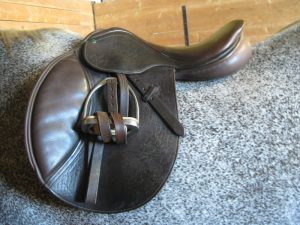A performance horse undergoes high physical demands, with excessive flexion and concussion to the joints. Lameness often results and has the potential to end a horse’s career. An estimated sixty percent of lameness problems in horses are related to osteoarthritis (OA), a degenerative joint disease. Osteoarthritis is most often caused by excessive exercise and trauma, when the joint cartilage can no longer repair itself at a fast enough rate. The need to prevent and treat this widespread and painful disease is evident and many options are available. These treatments include joint injections, anti-inflammatory drugs, and the most popular option, nutraceutical joint supplements with main ingredients glucasoamine, chondroiten, and hyluronic acid (HA).
When I was at Penn State in 2010, I wrote a research paper for my Equine Nutrition class on “The Effectiveness of Oral Glucosamine, Chondroitin, and Hyaluronan in Treating Equine Osteoarthritis.” I put a lot of research into this paper and it ended up winning first place in the undergrad division in the United States in Alltech’s Young Scientist Competition. So I wanted to quickly sum up the most important parts of this paper, and I will gladly email a copy to anyone who wants a more in depth read (just go the the contact page), be forewarned though that the actual paper gets a bit scientific!
Basically, there is evidence from research in horses and numerous other species that joint supplements do work. The controversy is can they prevent osteoarthritis and in what form are the ingredients best utilized. Be aware that these top three ingredients can come from different sources and in different chemical forms and that absorption and bioavailability do vary. Most of the time, you pay for what you get. But that brings up another big issue – when tested, many of the joint supplement products on the market did not actually contain the amounts of active ingredients that they claimed. Nutraceuticals are not formally regulated, so there is room for dishonesty or sloppy processing on the part of the manufacturers.
So this paragraph sums up my thoughts from the paper, and if you want more info email me for the complete report!
“Glucosamine, chondroitin, and hyaluronan have been shown to promote beneficial effects in prevention and treatment of osteoarthritis. As previously mentioned, many products are available; however, the equine joint nutraceutical market is in need of a quality supplement with a guaranteed analysis, and backed with research and field trials to prove its effectiveness. Due to consideration of previously discussed studies, a combination of glucosamine sulfate, low molecular weight chondroitin-4-sulfate, and hyaluronan may be best, although their effectiveness together has not been tested. Although further research would need to be conducted to determine the most efficient but effective ingredient quantities and dosage of this new nutraceutical, chondroitin could be included in a lower amount because of its accumulation in plasma. As our demands of athletic performance from our horses continue so will the occurrence of OA. A nutraceutical product that matches its label claims and effectively prevents or treats this debilitating disease would be valuable for horses and their owners.”













3 Responses
For years I have given one of my horses and my mini donkey Grand Flex by Grand Meadows. My Vet recommend it when my older gelding had his back legs give way when he was running. The problem was his stifle. My donkey would limp due to an injured shoulder. As long as they received their daily dose they were fine.
Once due to circumstances they were off the Grand Flex for a month and their problems came back. Now that they are back on the program they are doing fine. I know for sure the supplement is working.
It’s my Vets opinion that all horses sixteen or older would benefit from a joint supplement. There are a lot of them on the market. Some better than others. Ask your Vet for a recommendation.
Do you have a recommendation on which supplement is best for joints?
Hi Laura, did you take a look at the article? Unless something has changed since when I did this research, Cosequin is the only product guaranteed to contain what it says it does. That doesn’t mean there aren’t other good products, but I’m hesitant to give recommendations when I don’t confidently know what is in the product.